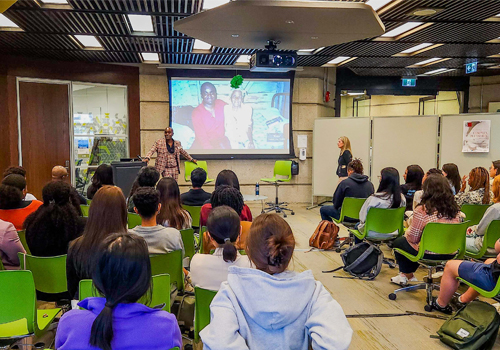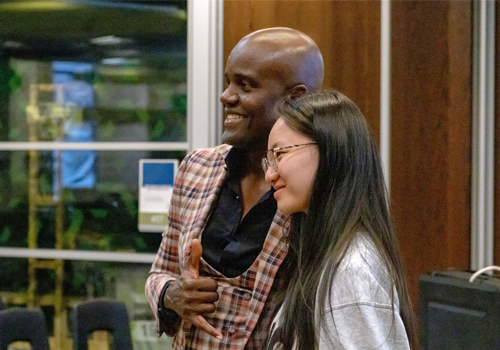What’s one trait every entrepreneur must have?
According to Wes Hall, respected business leader, entrepreneur and dragon investor on CBC’s Dragons’ Den, it’s knowing your values and beliefs — and staying true to them.
"We have to have our principles and we have to live by them, especially when we start our own companies because as soon as you start to compromise, the compromises get bigger and bigger,” Hall explains.
This and other valuable pieces of advice came out of a recent fireside chat hosted by Melanie Woodin, dean of the Faculty of Arts & Science, on September 22. Dozens of A&S students and alumni attended in person or watched via livestream to hear Hall delve into his path to prominence and his responses to questions submitted by attendees.
“We're committed to engaging in thoughtful conversations and taking meaningful action on systemic racism and the obstacles faced by the Arts & Science community,” Dean Woodin said in her opening remarks. “I can't wait to get to hear more about your journey, Wes, and your innovative ideas on a productive and meaningful and authentic way forward.”
An expression people often use is ‘Pull yourself up by the bootstraps.’ What happens when you have no boots? How do you pull yourself up?
The evening started with a look back at Hall’s humble beginnings.
Raised by his grandmother in a tin shack in Jamaica, Hall recalls the poverty he and his siblings experienced. In childhood pictures shared at the event, they rarely had shoes on their feet.

“An expression people often use is ‘Pull yourself up by the bootstraps.’ What happens when you have no boots? How do you pull yourself up?” asked Hall, whose recently released memoir is aptly called No Bootstraps When You're Barefoot.
Despite the challenges, Hall is grateful for much of his childhood — including bonding with his grandmother, who instilled in him a robust work ethic, and for growing up in a country in which he saw Black men and women working in positions of authority as lawyers, judges, doctors and business leaders.
When he came to Canada as a young man, he was determined to work hard and achieve success — which he did.
Today, as founder and executive chairman of Kingsdale Advisors, a leading shareholder services and advisory firm with offices in Toronto and New York, he works on high-profile business transactions in North America, including deals for Air Canada, Citigroup, Tim Horton's, Petro-Canada and other organizations.
Hall, who owns several other businesses, holds honorary doctorates from Toronto Metropolitan University, the University of Ottawa and the University of the West Indies. He was also recently honoured with the Global Citizen Award by the United Nations Association in Canada and named the Canadian Business Leader of the Year by the Canadian Chamber of Commerce.
Though he has many accomplishments and accolades to his name, he’s disappointed that he’s among only a few Black executives on Bay Street and perhaps the most prominent Black business leader in Canada.
“That's a problem. That's a systemic problem. Because that would suggest I'm smarter than everybody else and that's really not the case. That's an affront to all the other people who went to Harvard University, who went to U of T or other schools, but haven't gotten the opportunity,” says Hall, who in 2020 launched the Black North Initiative, which challenges Canadian businesses to end systemic racism through a business-centric approach.
If you get hit, you have to get up and you say, ‘Good job, but that's not going to stop me,’ that's the attitude you need to have. That's being built like a running back.
In addition to sharing examples of his experiences with racism and discrimination in the workplace, Hall advised attendees — especially those who are immigrants or who identify as Black — to channel lessons from football when faced with adversity.

“If you want to be successful in business, on Bay Street, you’ve got to be a running back,” he explains. “If you get hit, you have to get up and you say, ‘Good job, but that's not going to stop me,’ that's the attitude you need to have. That's being built like a running back.”
He also draws parallels between how running backs need to find openings to advance the field and how young professionals must pursue opportunities that arise. And in the same way these football players rely on teammates to block hits from the opposing team, students and alumni need to find mentors and champions to support them in their professional careers.
Above all else, he advises students to live truthfully and as their whole selves. In Hall’s case, that means proudly embracing his culture: from unashamedly speaking with an accent to donning a colourful wardrobe in honour of his Jamaican roots.
“I want to open people’s minds up as to how beautiful this country is that somebody can speak with an accent, or they can speak a different language, and they're still acceptable, and they're still good at what they do and could be the best you've ever seen,” Hall explains.
Hall also urged the audience to be allies who speak up when they observe offensive behaviour, whether it’s directed at them or not. Laughing uncomfortably or remaining silent when a racist joke is told or teasing coworkers about their culture contributes to a toxic and alienating work environment, he says.
“When I talk about allyship, it is not just about saying ‘I'm not a racist,’ but you have to be anti-racist — meaning you have to actively say ‘This is not acceptable’,” he explains. “When we see something wrong, we do something about it.”
Missed Dean Melanie Woodin’s fireside chat with Wes Hall? Watch the recording!

